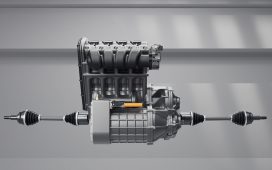Intelligent transportation is emerging as a global trend and a revolutionary force in the field. Bellwether Advanced Mobility Solutions (BAMS), a subsidiary of the UK-based Bellwether Industries, is developing a new electric vertical takeoff and landing (eVTOL) transport vehicle designed for urban mobility. The aircraft is anticipated to become widely available by the year 2030.
Bellwether currently possesses three generations of prototypes. The full-sized prototype is projected to have a length of around 6 meters, while the half-sized version measures approximately 3 to 4 meters, representing 50% to 60% of the full-sized model. The focus during testing is primarily on assessing overall flight performance and gathering data. The unmanned half-sized prototype serves this purpose. However, as they transition to the full-sized version, it is anticipated to accommodate approximately 4 to 5 seats. Initially, a driver will still be required before fully transitioning to autonomous driving.
From a technical standpoint, Taiwan’s involvement in the project extends to significant contributions to adaptive electric propulsion systems and cognitive flight control systems. The project emphasizes concealing propellers and power systems for a sleek and integrated structure, which will aid in minimizing noise and protecting passengers and urban wildlife. The international partnership seeks to leverage Taiwanese expertise to advance technology and broaden its applications globally.
Manufacturing partnerships are already underway, with a manufacturing facility in Dubai for the short term. The interest and support received from Enata, a UAE-based advanced technologies group specializing in high-end performance and innovative products in aerospace, marine, industrial, and automotive sectors, have been encouraging.
Source: Bellwether Industries
However, there are ongoing considerations to bring production to Taiwan, with plans for a research center in Taiwan. “In the short term, production will stay in Dubai, but we’re actively exploring possibilities and engaging with relevant entities to bring manufacturing back to Taiwan,” said a BAMS representative.
While the price implications of materials like carbon fiber remain uncertain due to their current high costs, BAMS anticipates that ongoing advancements in materials and technology will contribute to cost reductions in the future.
While flight control and communication systems are designed in-house by BAMS, the collaboration also involves using satellite services. “We’re currently working closely with Inmarsat to use their satellite system. They’re keen on downsizing some of their satellites as smaller devices on our aircraft, allowing for more accurate positioning and navigation.”
As the aerial traffic system is being developed, it becomes more convenient for satellite service providers to manage various positioning tasks. This streamlining of information reception enhances communication between vehicles, a critical aspect of the operation of BAMS aircraft.
The startup aims to be environmentally sustainable and chose an all-electric design to reduce emissions and ecological impact. Although the transport vehicles currently rely on lithium batteries produced in Europe, the team remains aware of ongoing developments in battery technology and did not exclude the possibility of adopting alternative and more advanced solutions in the future.











